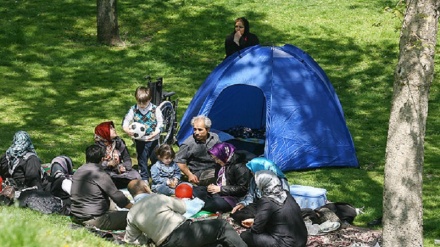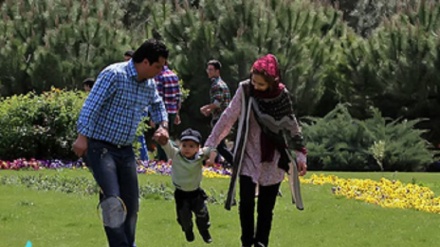Iranian Family (2)
Today, we introduce and define nuclear family and further discuss the features of Islamic upbringing within families.
If you pay close attention, you come to realize that you are not the ones who choose your families, and the fact of the matter is that the family is a gift bestowed by God upon you.
In the beginning, we draw your attention to a number of psychological points about couples' relationships. Marriage, with all of its complexities, resembles a fresh sapling which may not grow as such if you don't nurture it appropriately.
After marriage of couples, everything becomes transparent, with the married couple trying to build their lives. Firstly, let's pay attention to the differences. Some of your differences with your spouse emanate from your gender. Currently, the science of psychology has pointed out that men and women do not have the same characteristic traits, and maintain different mentalities. They manifest major differences in their creation which distinguishes them from each other. It is based on these differences that they are attracted toward each other. Initially, gain information about the opposite sex and single out the differences which stem from gender difference and/or differences which are rooted in your attitudes. Differences of attitudes can be compromised. However, differences rooted in gender are only accepted with the development of a mutual understanding.
It is necessary for you to specify your duties in the early days of marriage. For instance, the terms of allocation of the earnings of men and their spouses; level of contribution of men and women in house chores; and terms of mutual assistance of married men and women, should be pointed out. If these duties are specified based on mutual love and prudence, no one would feel overwhelmed because of shouldering excessive duties. Division of responsibilities leads to durability of your married life. The life of the venerable daughter of Prophet of Islam, Hazrat Fatemeh (SA), is a role model for successful Muslim women.
Any change in the social conditions of the community contributes to a change in the shape and structure of families. When the needs and goals of humans change with the passage of time, families also experience a number of changes. As of the 19th Century to this date, the formation of social order, based on the pivotal role of the labor market and factory-based economy, has prompted changes in families. With the development of the social system and establishment of modern organizations such as the Department of Education, factories, and mass media; some of the main functions of families were delegated to these organizations and institutions; dropping familial duties and shaping nuclear families.
Nuclear families are families which are comprised of parents and their children. This type of family which was promoted after the industrial revolution in the West, consists of parents and their children; and does not incorporate other relatives. In nuclear families, the paternal or maternal figure and/or both parents administer the family's economy and are financially independent of their immediate relatives. Oftentimes, in nuclear families, the main familial decisions are made via dialog and exchange of views.
Some experts, such as Parsons, believe that nuclear families are governed by wisdom and logic, and in adoption of major decisions, any of the family members who maintains a stronger logic, has the right to make decisions. Nuclear families are never extended, given that as soon as children reach the legal age, and enter the community, they seek jobs and form a new life, establishing a new independent family, as an active member of the society. Nowadays, nuclear families can be observed in different parts of the world.
Mr. Rahimi and his wife are an epitome of nuclear families in Iran. their children, consisting of two boys and three girls, have left their paternal home upon marriage. In this family, both parents have remained interested in each other throughout the years. They live in a two-room seventy square meter house. Throughout holidays, their home is warmhearted and packed due to the presence of their adult children. However, in weekdays, their house is mired in silence. Homes of their children are at a far distance, which makes it difficult for them to visit their paternal home. Hence, telephone is their most important tool of communication. Mr. Rahimi and his spouse maintain amicable and cordial relations with their neighbors and associates. Attendance at the mosque provides them the best means to communicate with others, and to establish peace of mind. Their main problem is the difference of opinion between their son and their daughter-in-law. Their son has a six-year-old child, but is not in good terms with his wife. They are concerned that the possible separation of their son and daughter-in-law would leave their grandchild with emotional scars. Meanwhile, they have never intervened in their children's married lives. They opine that any possible intervention in the married lives of their children may backfire and ultimately trigger further problems. In the meantime, they are looking for someone, who would mediate for the resolution of disputes between their son and daughter-in-law. Mr. Rahimi's other son visits his paternal home to a lesser extent. Nonetheless, Mr. Rahimi is gladdened because of the strong emotional bond between his other son and daughter-in-law.
It can be said that nuclear families are the cornerstones of contemporary industrial communities. In nuclear families; family members experience a sense of physical and spiritual belonging toward each other. The main goals of nuclear families are to establish amity, and peace of mind. Nowadays, many nuclear families are observed in numerous countries, including Iran. based on the statistical figures released in the year 2011, nuclear families constitute more than 60% of Iranian families.
In nuclear families, the interests of the would-be-brides, and would-be-grooms are also prioritized.
Based on the divine religion of Islam, the solidarity of the community is rooted in the unity of couples and family members, while emotional bonds within families can be extended to the society. In the Islamic outlook, an Islamic family is founded on ethical principles. In the history of Islam, and following the victory of Iran's Islamic Revolution, many examples of successful Islamic marriages can be named, which can be taken into consideration as role models for other families.
MR/SS



